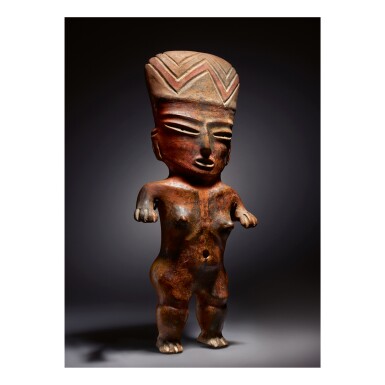Art of Africa, Oceania and the Americas
Art of Africa, Oceania and the Americas
LARGE TLATILCO STANDING FEMALE FIGURE, MORELOS REGION EARLY PRECLASSIC, CIRCA 1200-900 BC
Auction Closed
May 13, 08:41 PM GMT
Estimate
40,000 - 60,000 USD
Lot Details
Description
Property from an American Private Collection
LARGE TLATILCO STANDING FEMALE FIGURE, MORELOS REGION EARLY PRECLASSIC, CIRCA 1200-900 BC
Height: 16 ⅞ in (42.6 cm)
D. Daniel Michel, Chicago, acquired in 1957 (inventory no. 58:051)
Ancient Art of the New World, New York, acquired from the above
American Private Collection, acquired in 1991
PUBLISHED
Allan Wardwell, Primitive Art from Chicago Collections, Chicago, 1960, fig. 3.
Leo Rosshandler, Man-Eaters and Pretty Ladies: Early Art in Central Mexico from the Gulf to the Pacific, 1500 B.C. - 500 A.D., Montreal and New York, 1971, cat no. 134 (not illustrated)
The Art Institute of Chicago, temporary loan from D. Daniel Michel, 1959
The Art Institute of Chicago, Primitive Art from Chicago Collections, November 16, 1960-January 2, 1961
Montreal Museum of Fine Arts, Man-eaters and Pretty Ladies: Early Art in Central Mexico from the Gulf to the Pacific, 1500 BC-500 AD, January 15-March 8, 1971
The large red-slipped female figures from the Early Preclassic era are a specialized, rare category classified as Type DK. These hollow figures represent a more sophisticated firing technology used for figures of complex iconographic imagery. This refined and imposing figure belongs to the "Displayed Deity complex" (Bradley and Joralemon, The Lords of Life, Notre Dame, 1993), whereby a set of abstract images are incised and/or painted on the heads and torsos, serving as emblems of fertility and power of a supernatural. Images include a splayed quadruped, corn symbols and attributes of female genitalia in schematized and stylized form.
This figure is of taut and well modeled physiognomy with small prominent breasts, sculpted clavicles and ribcage, muscular legs bound by constricting kneebands, and flexed fingers. Her face shows a fully attained trance accentuated by the narrowed slit eyes and parted lips. Her tall rectangular turban is deeply incised with a concentric zigzag motif front and back, a variant of the splayed figure motif seen on another large hollow figure in the Snite Museum collection (ibid., cat. no. 17). Her torso shows a distinct color patterning in reddish brown and black along the torso and under the breasts. This decoration identifies her with the Displayed Deity supernatural iconography.


